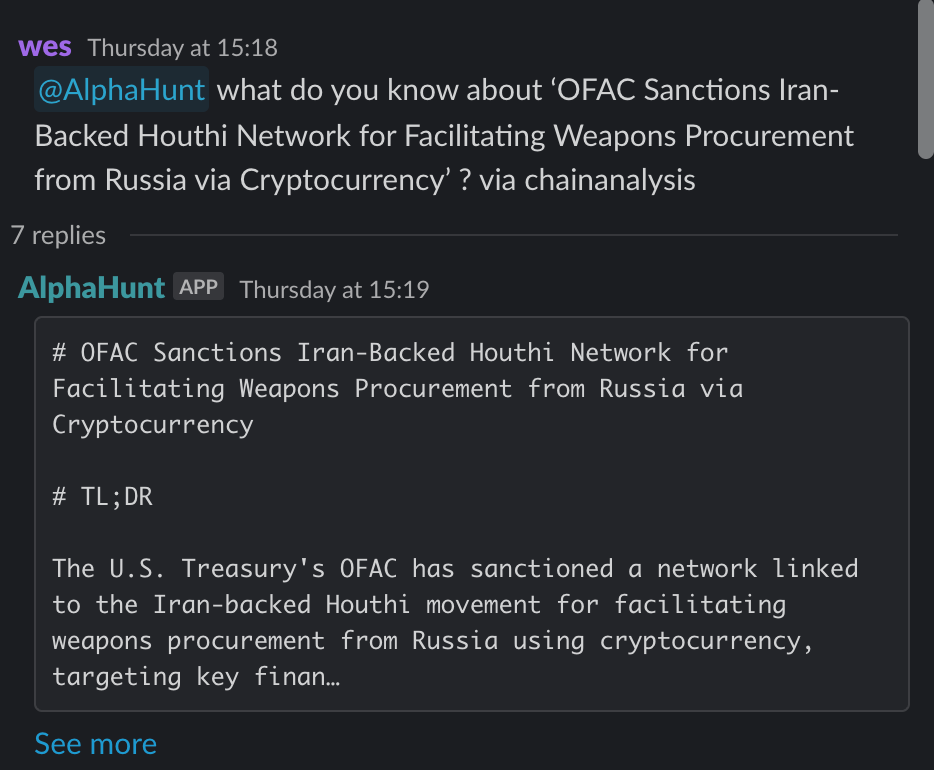Cryptocurrency Evasion Tactics: The Houthi Network's Strategic Exploitation
The Houthi network, known for its involvement in the Yemeni conflict, has developed intricate operational methods to evade international sanctions and facilitate arms procurement through cryptocurrency...


Cryptocurrency Evasion Tactics: The Houthi Network's Strategic Exploitation
TL;DR
Key Points
-
- The Houthi network uses multiple cryptocurrency wallets to obscure fund flows and evade sanctions.
- Regulatory bodies need to enhance oversight and implement stricter KYC and AML regulations.
-
- Exploitation of exchanges like Garantex facilitates conversion of cryptocurrencies, evading financial scrutiny.
- International cooperation is crucial to monitor and disrupt these illicit financial activities.
-
- Complex front company networks mask illicit activities, complicating sanctions enforcement.
- Targeted sanctions against these entities can disrupt operations and limit resource procurement.
-
- Regulatory gaps in cryptocurrency transactions are exploited by the Houthi network.
- Comprehensive reforms are needed to close these gaps and enhance financial system integrity.
Research
The Houthi network, involved in the Yemeni conflict, employs sophisticated methods to evade international sanctions and procure arms using cryptocurrency. They utilize multiple cryptocurrency wallets to enhance anonymity and exploit exchanges like Garantex to convert digital assets, bypassing traditional financial scrutiny. The network also establishes complex front company networks to mask illicit activities, leveraging international partnerships and regulatory gaps.
The operational methods of the Houthi network pose significant challenges for international sanctions enforcement. The anonymity provided by cryptocurrency transactions complicates efforts to trace and disrupt funding sources. To counter these tactics, regulatory bodies are urged to strengthen frameworks, enhance international cooperation, and invest in advanced blockchain analytics tools. These measures aim to improve monitoring, disrupt illicit operations, and close regulatory loopholes exploited by the network.
In the short term, increased regulatory scrutiny on cryptocurrency exchanges and enhanced international cooperation are anticipated. Long-term forecasts suggest the adoption of advanced blockchain analytics tools and evolving tactics by the Houthi network to adapt to increased scrutiny. Speculative scenarios include the potential use of decentralized finance platforms and non-fungible tokens to further obscure financial activities.
Techniques and Tactics Employed by the Houthi Network
-
Multiple Cryptocurrency Wallets:
- The Houthi network employs various cryptocurrency wallets to obscure the flow of funds and enhance anonymity. The U.S. Treasury recently identified eight specific wallets linked to their arms procurement and sanctions evasion efforts. These wallets are strategically used to facilitate transactions without drawing attention to the network's activities (U.S. Treasury, 2025).
-
Exploitation of Cryptocurrency Exchanges:
- The Houthi network has been linked to the Russian cryptocurrency exchange Garantex, which has been sanctioned for its role in facilitating illicit transactions. Garantex has been identified as a platform where the Houthis deposit funds, allowing them to convert cryptocurrencies into fiat currencies or other digital assets, thus evading traditional financial scrutiny. Recent reports indicate that nearly $1 billion in funds linked to Houthi operations were processed through these wallets (Cointelegraph, 2025).
-
Front Company Networks:
- The Houthis have established complex networks of front companies that serve as legitimate business facades to mask their illicit activities. These companies are used to conduct transactions that appear legitimate, thereby facilitating arms procurement and other sanctioned activities. The U.S. Treasury has noted that these front companies are integral to the Houthi's operational strategy, often involving international partners to enhance their reach (U.S. Treasury, 2025).
Role of International Partnerships and Regulatory Gaps
-
International Partnerships:
- The Houthi network benefits from international partnerships, particularly with entities in countries that have less stringent regulatory frameworks. These partnerships enable the Houthis to access resources and markets that would otherwise be closed to them due to sanctions. The support from Iran is particularly notable, as it provides both financial and logistical assistance to the Houthi operations (U.S. Treasury, 2025).
-
Regulatory Gaps:
- The current regulatory landscape presents significant gaps that the Houthi network exploits. The lack of comprehensive oversight in cryptocurrency transactions allows for the movement of funds without adequate scrutiny. The U.S. Treasury has highlighted the need to close these gaps to prevent illicit actors from using digital currencies to evade sanctions. The 2024 National Strategy for Combatting Terrorist and Other Illicit Financing emphasizes the importance of addressing these vulnerabilities (U.S. Treasury, 2024).
Implications for International Sanctions Enforcement
The operational methods employed by the Houthi network pose significant challenges for international sanctions enforcement. The use of cryptocurrency allows for anonymous transactions that are difficult to trace, complicating efforts to monitor and disrupt their funding sources. The establishment of front companies further obscures their activities, making it challenging for regulatory bodies to identify and sanction illicit operations.
Recommendations, Actions, Suggested Pivots, Forecasts and Next Steps..
(Subscribers Only)



![[FORECAST] ShinyHunters SaaS Data Theft: Why Non-Ransom Monetization Looks Increasingly Attractive](/content/images/size/w600/2026/02/z.png)

